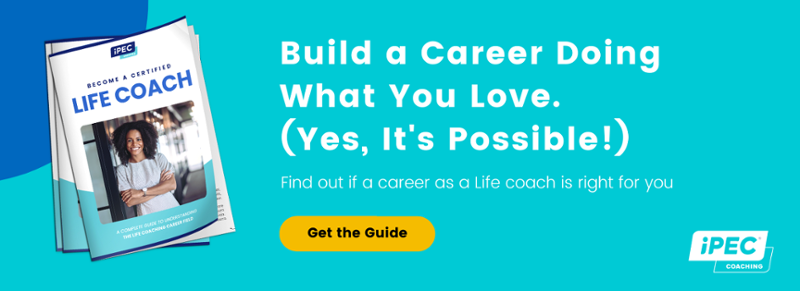Wondering How to Make a Career Change? 4 Ways to Get a Jumpstart
by Farrah Hudson
Jun 20, 2016 | 5 minutes read
Wondering how to make a career change? Here are 4 steps to help get you there.
Have you ever woken up and felt not-so-ecstatic about the day ahead? Perhaps you’ve lost a bit of direction? Maybe you’ve asked yourself: where has my passion gone?
Getting curious around your thoughts and feelings builds awareness. And, the thought of change, or making a transition, might feel a bit overwhelming.
You might be wondering how to make a career change, and have finally admitted you’re not happy or have hit a ceiling and want to be challenged more. But the idea of making a career change might cause you even more discomfort than the option to do nothing. So, you resign yourself to finding more happiness in your current job. Yet, sooner or later you might experience even lower morale (and even lower buy-in) than before.
Sound like you? If you’re struggling to find more purpose and freedom, then you might be ready to make a career change. Or better yet—an overall “lifestyle” change.
"The only way to make sense out of change is to plunge into it, move with it, and join the dance."
—Alan Watts
It’s a big step to examine your career and consider the possibility that you want to lean into your truest purpose and your most authentic self. And it makes total sense if it feels like a big risk to wonder if there’s something out there that could bring you into better alignment with your dreams and passions.
Here’s the thing: a career doesn’t have to be something that happens to you—a series of random events that lead you into (or out of) the right places at the right times. You don’t have to be a passenger in your life anymore. You can actually choose to direct your trajectory, rather than feeling at the effect of forces beyond your control.
Maybe you already know what you were meant to do, but you’re too afraid to try (and fail!), so instead of making the leap, you stay stuck. Or perhaps you are at a genuine loss for ideas—all you know is what you don’t want to do. This is totally normal!
Luckily, there are a few ways to move forward from feeling stuck, but all of them involve courage and the belief that what you’re meant to do is out there waiting for you.
Regardless of which road you choose, remember that the hardest part—admitting to yourself that change is necessary—is already behind you.
Here are 4 steps to help you navigate questions around how to make a career change:
1) Talk to a Career Coach
Meeting with a career coach is a great first step when you’re considering making a career change. By identifying what you find most meaningful, purposeful, and fulfilling, you can gain clarity on the type of work that you love to do and explore your best options for moving forward.
Remember that it’s extremely common for your true desires and motivations to be hidden underneath a tough surface of expectations learned from your culture, family, and personal experiences. For example, your parents’ attitudes about their own careers may have instilled the idea that work was just something you had to suffer through.
Career coaches can offer a helpful outside perspective, employing diverse tools that are designed to help you look beyond those limitations to realize things that you probably already know about yourself—like your personality, motivations, innate talents, and deepest desires for fulfillment.
Being able to uncover these hidden truths about yourself is challenging work, but making the commitment to try is vital for moving out of the inertia and discomfort of the present. A career coach is uniquely trained to work with people who are exactly where you are right now—helping uncover latent motivations, dreams, and abilities, so you can move yourself out of limbo and into your next chapter.
2) Crowdsource a New Perspective
Often, the people you choose to surround yourself with are a fairly accurate representation of who you are and who you want to be. Tapping into this resource of multiple viewpoints on your life and career can shift your thinking from self-reflection to the broad view of how others see you. Ask the people you trust the most simple question:
What do you think I could do with my life?
Avoid the word “should” here, which is an invitation for advice, and instead employ the possibility-rich word “could.” Try your best to listen with an open heart to what your loved ones have to say about you. Instead of shrinking from the pieces of information that are the most difficult to hear, remain curious about the perspective that you’re being offered. An ability to listen to other people’s perspectives of you is a key component in seeing yourself with clarity and compassion.
3) Volunteer Your Time
"The best way to not feel hopeless is to get up and do something... If you go out and make some good things happen, you will fill the world with hope, you will fill yourself with hope."
—Barack Obama
A great way to get out of your own head and out of your own way is to seek out opportunities to be of service to others. When was the last time you took a moment to make someone else’s life easier? And when did you last devote time to someone who needed it and come away with anything less than a renewed appreciation for the gifts you’ve been given?
Finding opportunities to be of service doesn’t necessarily mean signing up for formal volunteering. It can be as simple as opening your perspective to include those around you who would benefit from kindness, especially those you have conflicted or negative feelings towards. You’ll be amazed by what happens when you shift from asking yourself, “what can I get?” to “what can I give?”
4) Consider Alternate Career Options like Coaching (Even if They Scare You a Little)
When considering a career change, it’s important to have a clear view of the things you really care about. You have a breadth of options at your disposal and many roads you can take, so think honestly about what you want out of your next job. How much flexibility do you need? What types of people do you want to work with? What kind of environment will you work best in?
For many people in career limbo, especially those seeking greater flexibility and independence, a career in coaching is a great fit.
Coaches are professionals who, instead of fixing problems, work to help their clients change the way they “show up” in their own lives. They focus on opportunities and solutions, rather than problems and limitations, and they help their clients successfully move from where they are now to where they want to be.
While coaching can appeal to individuals from every background, there are generally some shared qualities among people who were born to be transformative coaches:
- Feeling called to help others
- Being committed to continuous self-improvement
- Emphasizing strong relationships
- Possessing a genuine curiosity for learning and life
Does that sound like you? If so, you may be ready to embark on a journey that will not only transform your career, but give you the tools and empowerment to help others who are in the exact place that you are right now.
Coaching as a skill can be applied to nearly any profession or entrepreneurial endeavor, because at some point, everyone in every job type and industry experiences challenges... just as you did.
Imagine being the person who could help guide someone else someday!
Imagine having the freedom and passion to direct your own career and help nurture the careers of others.
Imagine creating a life and career that you love.
Regardless of what happens next in your career, know that you’re not alone. You’re now part of a huge community of people all over the world who have looked squarely at the traditional 9-to-5 work paradigm and decided it might not be a good fit after all. Welcome!
Curious About Becoming a Professional Coach?
Check out our in-depth guide to the field of coaching, and find out whether it might be the right career path for you!


